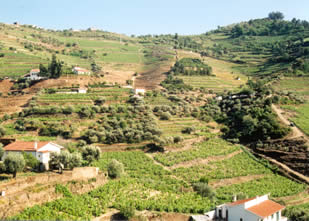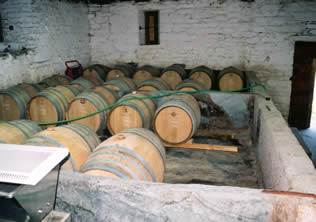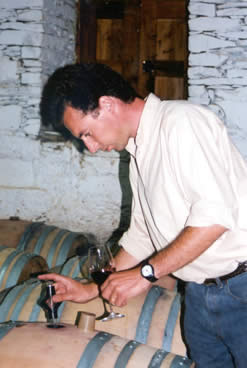|
The
Douro wine revolution
Part 4: Pintas
Sandra Tavares da Silva Serôdio Borges
Av. Júlio de Freitas, Vale de Mendiz, 5070 Alijó, Portugal
Tel: 936 161 408/932 722 700
The train ride
from Porto to the Douro takes ages (almost three hours; at just
€5.80 it's spectacularly cheap), and for most of the way it's a
sluggish crawl through the suburbs of Porto. But two hours out,
approaching Régua, the scenery suddenly changes, and you find
yourself in the spectacularly beautiful Douro. The train is actually a
good way to see the Douro for the first time: the track runs alongside
the river most of the way, with great views if you sit on the right
hand side of the carriage. My destination was Pinhão, in the heart if
the Douro, where I was picked up by Jorge Serôdio Borges, who took me
to see his own project, Pintas.
Pintas is an exciting new wine. It’s the project of husband
and wife team Jorge Serôdio Borges (Dirk Niepoort’s number two,
making wine Niepoort and Passadouro [note added February 2004:
Jorge has now left Niepoort]) and Sandra Tavares (winemaker at
Quinta do Vale D. Maria in the Douro, and also Chocopalha, her
family’s property in Estramadura). The grapes are sourced from 2
hectares
of old vines, containing some 25-30 different varieties.
| The wine is made in a rather rustic looking winery in Vale de
Mendiz that Jorge and Sandra purchased from Niepoort in time for the
2001 vintage, containing little more than some old granite Lagares, a
basket press and a crusher/destemmer. They have plans to build a house
in an adjacent building – when completed this will have stunning
views. Quality is the goal here. There’s a rigorous selection of
grapes as they come into the winery, with those that aren’t good
enough being rejected. This is an essential step: because the
vineyards contain mixed varieties, not all the grapes were ripe at the
same time in 2001. [Incidentally, one of the local guys who helped out
at harvest time made his own wine from the rejected grapes: I have no
idea what it tastes like…]
|
n |

The view from Vale de Mendiz |

Barrels of Pintas filling the lagares |
n |
The grapes are then crushed, destemmed and fermented in
lagares, before being transferred to barrel for malolactic
fermentation. A mixture of new (70%) and one year (30%) oak is
used (the second-use barrels come from Quinta do Vale D.
Maria, where Sandra is the winemaker). Jorge and Sandra have
made a considerable investment in barrels: new ones typically
cost €500, and one-year old barrels are about half this.
|
|
6000 bottles will be produced from this inaugural vintage;
bottling is likely to take place in January. Jorge patiently talked me
through samples from several of the barrels. I’m publishing all my
notes for the sake of completeness here, but there are further notes
on a cask sample blend of Pintas included in the write up of the big
tasting at Chanceilleros. The usual caveats about barrel-tasting
apply.
I was really impressed by what Jorge and Sandra are doing
here. These are deeply impressive wines with lots of Douro character
in a polished, rich, ripe style. It will be fascinating to see how the
final wine turns out. My prediction is that Pintas will become one of
the real stars of the Douro, and I felt privileged to have the chance
to try it this early on in its life.
As an aside, Pintas is also the name of Jorge and Sandra’s
ebullient puppy. I’m not good on dogs, so I can’t tell you the
breed, but it’s a reasonably cute brown-spots-on-white hunting dog,
whose father I met later at Quinta do Crasto.
|
n |

Jorge taking barrel samples |
Barrel 1 new François Frères Vosges oak. This is a big,
black brooding monster of a wine. Rich, intense nose with some spicy
oak showing. Massive concentration with very ripe fruit and firm
tannins. Wonderful spicy complexity: taut with herbal richness.
Barrel 2 new François Frères Allier oak, soft toast. More
acid and spice here. Overall a little smoother, but still very tannic.
Barrel 3 medium toast new Allier oak. Much more toasty oak on
the nose with a pronounced roasted character.
Barrel 4 new medium toast from Tonnellière Billon. This one
shows firm tannins and a slightly muted nose, with some roasted
character.
Barrel 5 Seguin Moreau Allier medium toast, new. Quite tight
and firmly tannic.
Barrel 6 One-year old barrel. This wine is more noticeably
herbal, with a slightly lighter structure. Very expressive and a good
blending component.
Barrel 7 One-year old from Cadus. Really impressive with a
lovely herbal complexity.
for a more recent review of Pintas (May 2004),
see this article
wines tasted June 2002
Back to top
|

